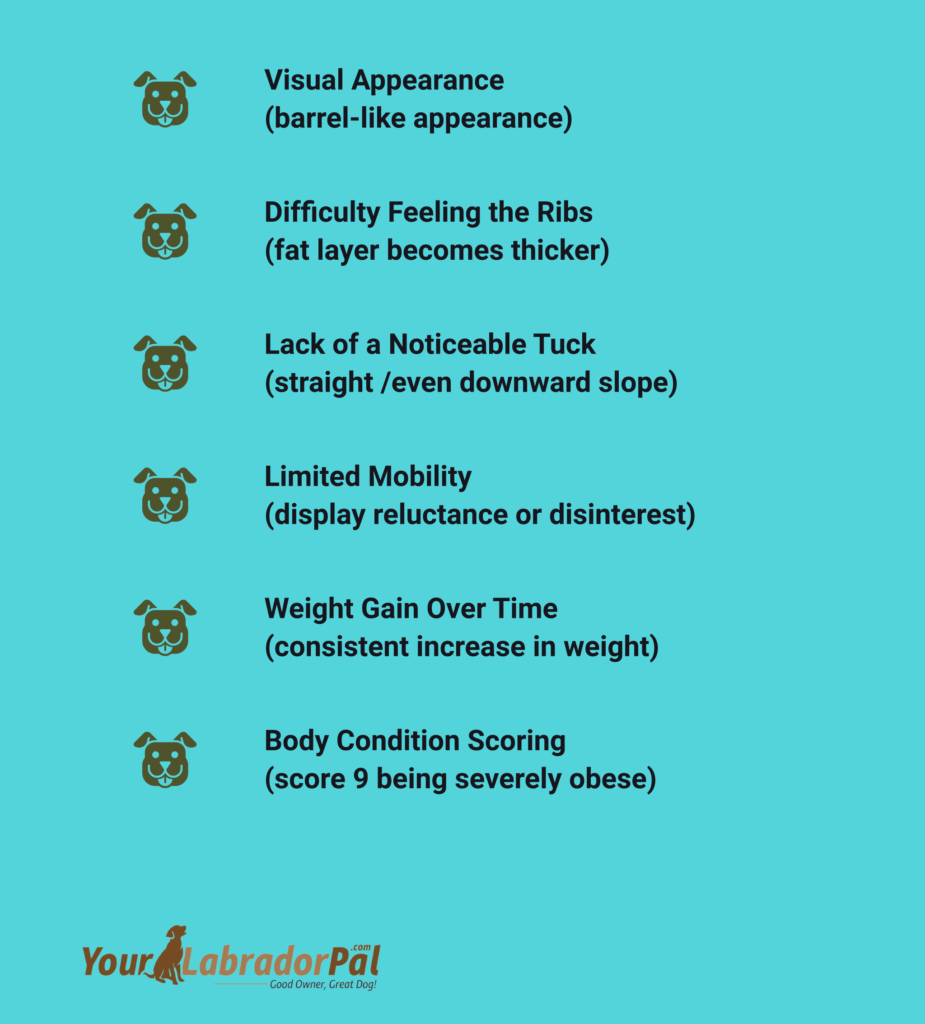Obesity in Labradors: Keeping Labradors Fit and Fabulous
Obesity is a growing concern among our furry friends, and Labrador Retrievers are no exception. These lovable and energetic dogs are known for their insatiable appetites and boundless enthusiasm. However, without proper care and attention to their diet and exercise, Labradors can easily fall victim to obesity. In this blog post, we will delve into the causes, consequences, and practical solutions to tackle obesity in Labradors, ensuring that these loyal companions lead healthy and fulfilling lives.
Are Labradors Prone To Obesity?

Yes, Labradors are prone to obesity. Labradors are known for their love of food and have a tendency to overeat if not properly monitored and given a balanced diet. They have a slower metabolism compared to some other dog breeds, which means they require fewer calories to maintain a healthy weight.
Labradors also have a genetic predisposition to obesity. Some Labradors have a specific gene mutation that affects their appetite regulation, making them more prone to overeating and weight gain. This genetic factor, combined with their food-driven nature, increases the likelihood of obesity in Labradors.
Furthermore, Labradors are generally active and energetic dogs, but if they don’t receive enough exercise or mental stimulation, they may become sedentary and gain weight. Lack of regular physical activity contributes to obesity in Labradors.
Factors Contributing To Obesity In Labradors
Labrador obesity can be influenced by several factors, including genetic predisposition, diet, exercise levels, feeding habits, and overall lifestyle. Here are some factors that can contribute to Labrador obesity:
🟩 Genetics
Firstly, let’s talk about genetics. Just like humans, Labradors can have a genetic predisposition to obesity. Some Labs may have a slower metabolism or an innate tendency to gain weight more easily, even with proper diet and exercise. So, if your Labrador seems to have a tendency to pack on pounds, it might be worth considering their genetic makeup.
🟩 Poor feeding habits
Another significant factor is overfeeding and poor feeding habits. Labradors are known for their hearty appetites and food obsession. They can be quite persuasive when it comes to getting treats or extra food! Unfortunately, if we give in to their pleading eyes too often or leave food available all the time, it can lead to weight gain. So, practicing portion control and establishing consistent feeding schedules is crucial.
🟩 Lack of movement
A sedentary lifestyle is another contributor to obesity in Labradors. These dogs are energetic and active by nature, and they require regular exercise to maintain a healthy weight. If they don’t get enough physical activity, they are more likely to put on extra pounds. So, make sure your Lab gets plenty of opportunities to exercise and play, whether it’s through daily walks, playtime at the park, or engaging in fun activities like retrieving or swimming.
🟩 Type of diet
The type of diet you provide for your Labrador plays a significant role as well. Feeding them a diet that is high in calories, such as foods rich in fats and carbohydrates, can contribute to weight gain. It’s important to choose a balanced and appropriate diet for your Lab and avoid excessive calorie intake. Consult your veterinarian or a professional dog nutritionist to determine the right type and amount of food for your Labrador’s specific needs.
🟩 Boredom
Did you know that boredom can also contribute to Labrador obesity? Labradors are intelligent dogs, and they need mental stimulation to stay happy and content. If they lack mental stimulation, they may resort to overeating as a form of entertainment or to alleviate boredom. So, it’s important to provide them with engaging activities, interactive toys, and regular training sessions to keep their minds occupied.
🟩 Aging
As Labradors age, their metabolism may slow down, and they may become less active. This decreased activity level, combined with the same feeding habits, can result in weight gain. Therefore, as your Labrador grows older, it’s crucial to adjust their diet and exercise routine to accommodate their changing needs.
🟩 Neutering
Neutering or spaying can also affect a Labrador’s metabolism and energy requirements. Altered dogs may require fewer calories, and if their diet is not adjusted accordingly, it can lead to weight gain. So, it’s essential to work with your veterinarian to determine the appropriate calorie intake for your Labrador after the procedure.
🟩 Medical history
Lastly, certain medical conditions can contribute to weight gain in Labradors. Conditions like hypothyroidism or Cushing’s disease can affect their metabolism and make weight management more challenging. If you suspect an underlying medical issue, it’s important to consult with your veterinarian for proper diagnosis and treatment.
Health Risks Associated With Obesity In Labradors
Obesity is a significant health concern for Labrador Retrievers, as it is for many dog breeds. Labradors are known for their love of food and treats, and their tendency to overeat combined with insufficient exercise can lead to weight gain. This excess weight can have various detrimental effects on their health and well-being. Let’s look closer at the health risks associated with obesity in Labradors.
🟥 Joint problems
Labrador Retrievers are prone to joint issues, and obesity exacerbates these problems. The excess weight puts excessive strain on their joints, leading to conditions such as arthritis and hip dysplasia. Arthritis is a degenerative joint disease characterized by inflammation, pain, stiffness, and reduced mobility. Hip dysplasia is a hereditary condition where the hip joint does not develop correctly, causing abnormal wear and tear and leading to joint instability. These conditions can significantly affect the Labrador’s quality of life, causing discomfort, lameness, and difficulty performing everyday activities such as walking, running, or climbing stairs.
🟥 Diabetes
Obesity increases the risk of developing diabetes in Labradors. Just like in humans, excess body fat can impair insulin function, leading to insulin resistance and eventually diabetes mellitus. Diabetes in Labradors can be a serious condition that requires careful management. It can lead to symptoms such as increased thirst, frequent urination, weight loss, lethargy, and even life-threatening complications if left uncontrolled. Diabetic Labradors may require insulin injections, a carefully controlled diet, and regular blood sugar monitoring to maintain stable glucose levels.
🟥 Cardiovascular diseases
Overweight Labradors are more susceptible to heart diseases. The extra weight puts a strain on the cardiovascular system, leading to conditions such as high blood pressure, congestive heart failure, and cardiac arrhythmias. High blood pressure, or hypertension, can damage the blood vessels and organs over time. Congestive heart failure occurs when the heart cannot effectively pump blood, leading to fluid accumulation in the lungs and body. Cardiac arrhythmias refer to abnormal heart rhythms that can disrupt the normal functioning of the heart. These cardiovascular conditions can reduce the Labrador’s overall quality of life, limit their physical activity, and increase the risk of life-threatening events.
🟥 Respiratory problems
Obesity can compromise a Labrador’s respiratory system, making it harder for them to breathe properly. The excess weight in the chest and abdomen can restrict the expansion of the lungs, reducing lung capacity. As a result, Labradors may experience difficulties during exercise or even at rest, leading to panting, wheezing, and increased respiratory effort. Obesity-related respiratory problems can make Labradors more vulnerable to heat stroke and other heat-related illnesses. Labradors with respiratory issues may also be prone to respiratory infections, pneumonia, and other complications.
🟥 Reduced lifespan
Studies have shown that obesity can significantly shorten a dog’s lifespan. Overweight Labradors are at a higher risk of developing various health issues, including those mentioned above, which can lead to a decreased life expectancy compared to their healthy-weight counterparts. The strain on their organs, joints, and overall physiological systems can have long-term consequences that impact their overall health and lifespan. Maintaining a healthy weight is crucial for ensuring Labradors live long, happy, and fulfilling lives.
🟥 Increased surgical risks
If a Labrador requires surgery for any reason, obesity can increase the risks associated with anesthesia and recovery. The presence of excess fat can make it more challenging for an overweight dog to tolerate surgery and may lead to complications during and after the procedure. Surgical interventions on obese Labradors may have higher rates of wound healing issues, infections, and other postoperative complications. Additionally, anesthesia administration can be more challenging in obese dogs due to altered drug metabolism and increased risks of respiratory and cardiovascular complications.
🟥 Skin and coat problems
Obesity in Labradors can also impact their skin and coat health. The excess weight can make it more difficult for Labradors to groom themselves properly, leading to poor coat condition, matting, and increased susceptibility to skin infections. The folds of skin that can develop in obese Labradors are particularly prone to bacterial and fungal infections. Skin problems such as dermatitis, hot spots, interdigital cysts, and yeast infections are more common in overweight dogs. These skin and coat issues can cause discomfort, itchiness, and pain for Labradors.
🟥 Digestive disorders
Obesity can contribute to gastrointestinal problems in Labradors. Overweight dogs may be more prone to conditions such as gastroesophageal reflux disease (GERD), pancreatitis, and constipation. GERD occurs when stomach acid flows back into the esophagus, causing irritation and discomfort. Pancreatitis is the inflammation of the pancreas and can cause severe abdominal pain, vomiting, and loss of appetite. Constipation, on the other hand, is a condition where the dog has difficulty passing stools. These digestive disorders can cause discomfort, and pain, and affect Labrador’s appetite and overall well-being. A balanced diet, weight management, and proper portion control can help prevent these issues and promote a healthy digestive system.
🟥 Decreased exercise tolerance
Labradors are generally an energetic and active breed. However, obesity can significantly reduce their exercise tolerance. The excess weight places a burden on their cardiovascular and musculoskeletal systems, making physical activity more challenging. Labradors may tire quickly, have difficulty walking or running for extended periods, and be less enthusiastic about playtime. Regular exercise is essential for weight management and overall fitness, but it should be approached gradually and with consideration for an overweight Labrador’s limitations. Controlled exercise routines, low-impact activities such as swimming, and guided physical therapy can help obese Labradors regain their strength and mobility.
🟥 Increased risk during anesthesia
Anesthesia is a necessary part of various veterinary procedures, including surgeries and dental cleanings. However, obesity increases the risks associated with anesthesia administration. The presence of excess fat can affect the distribution and metabolism of anesthetic drugs, potentially leading to complications. Obese Labradors may require higher doses of anesthetic drugs, which can increase the risks of side effects and prolong recovery time. Additionally, obesity can affect Labrador’s ability to regulate body temperature during anesthesia, increasing the risk of hypothermia or hyperthermia. Anesthesia monitoring becomes crucial in overweight Labradors to ensure their safety and proper recovery.
If you suspect your Labrador is overweight, consult with a veterinarian who can provide guidance on diet, exercise, and weight management strategies specific to your dog’s needs. With proper care, nutrition, and exercise, Labradors can live a healthy and fulfilling life, reducing the risks associated with obesity and promoting their overall well-being.
How To Tell If A Labrador Is Obese?
To determine if a Labrador is obese, you can look for certain signs and perform a basic evaluation. Here are some indicators to consider:
🟫 Visual appearance
When assessing a Labrador’s weight, start by visually observing its overall body shape. An overweight Labrador will have a rounded, bulging abdomen, giving them a barrel-like appearance. There will be no visible waistline or distinction between the chest and abdomen. Additionally, you may notice prominent fat deposits along the back, tail base, and hips. These visual cues can indicate excess body fat and obesity in Labradors.
🟫 Difficulty feeling the ribs
A healthy Labrador should have a slight layer of fat covering the ribs that can be felt with gentle pressure. However, in an obese Labrador, the fat layer becomes thicker, making it difficult to feel the ribs. If you have to apply significant pressure or cannot feel the ribs at all, it suggests the presence of excess fat.
🟫 Lack of a noticeable tuck
From a side view, a Labrador at a healthy weight will exhibit a slight upward slope from the chest to the abdomen, creating a tuck or indentation in the waist area. This tuck is more apparent in fit Labradors. On the other hand, an obese Labrador will have a straight or even downward slope from the chest to the abdomen, with no distinct tuck. The absence of this tuck is an indication of excessive weight.
🟫 Limited mobility
Obesity can severely impact a Labrador’s mobility and energy levels. An overweight Labrador may display reluctance or disinterest in engaging in physical activities. They may tire easily during walks or playtime and exhibit difficulty climbing stairs, jumping, or running. Reduced mobility is often a consequence of carrying excess weight, as it places additional strain on their joints and muscles.
🟫 Weight gain over time
Regularly monitoring your Labrador’s weight is crucial. If you notice a consistent increase in weight over time and significant changes in its body shape, it may be indicative of obesity. Keep track of your dog’s weight by periodically weighing them and comparing it to breed standards or previous weights. Sudden or excessive weight gain should be addressed with a veterinarian.
🟫 Body condition scoring
Body condition scoring (BCS) is a system used by veterinarians to evaluate a dog’s weight and body composition. It involves assessing specific areas of the dog’s body, such as the ribs, waist, and overall body profile, to assign a score that indicates the dog’s weight status. Scores typically range from 1 to 9, with 1 being severely underweight and 9 being severely obese. Labradors should ideally have a BCS between 4 and 5, with a visible waistline and easily felt ribs.
Preventing And Managing Obesity In Labradors
Preventing and managing obesity in Labradors is essential for their overall health and well-being. Labrador Retrievers are prone to weight gain due to their genetic predisposition, love for food, and sedentary lifestyle. To ensure your Labrador maintains a healthy weight, it’s crucial to implement a comprehensive approach that includes a balanced diet, portion control, regular exercise, mental stimulation, body condition monitoring, regular vet check-ups, and weight loss programs when necessary. Let’s dive deeper into each of these aspects:
🟪 Balanced Diet
Feeding your Labrador a balanced and nutritious diet is the foundation of preventing and managing obesity. Labradors have a tendency to overeat, so it’s important to provide them with the right amount of food and choose high-quality dog food. Consult with your veterinarian to determine the appropriate type of food (dry kibble, wet food, or a combination) and the correct portion size based on your Labrador’s age, activity level, and size. It’s important to follow the feeding guidelines provided by the dog food manufacturer and adjust the portions as needed to maintain a healthy weight.
🟪 Portion Control
Avoid free-feeding, where food is available to your Labrador throughout the day, as it can lead to overeating and weight gain. Instead, establish a regular feeding schedule with set meal times. Measure your Labrador’s food portions using a measuring cup or a kitchen scale to ensure accuracy. This allows you to control your Lab’s calorie intake and prevents excessive consumption. Dividing their daily food allowance into two or three meals can also help prevent hunger and reduce the likelihood of begging for food between meals.
🟪 Avoid Table Scraps
Resist the temptation to feed your Labrador table scraps or human food. While it may be hard to resist those pleading eyes, many human foods are high in calories, unhealthy, or even toxic to dogs. Some common foods that are harmful to Labradors include chocolate, onions, garlic, grapes, raisins, and fatty foods. Stick to a diet formulated specifically for dogs, as they provide the necessary nutrients without the risk of causing obesity or health problems.
🟪 Regular Exercise
Regular exercise is crucial for Labradors to burn calories, maintain a healthy weight, and promote overall fitness. Labradors are active and energetic dogs that require plenty of physical activity to prevent boredom and excess weight gain. Aim for a minimum of 30 to 60 minutes of exercise per day, depending on your Labrador’s age, health condition, and energy level. Engage in activities like walking, jogging, swimming, playing fetch, or participating in dog sports such as agility or obedience training. Exercise not only helps them burn calories but also provides mental stimulation and strengthens the bond between you and your Labrador.
🟪 Mental Stimulation
Labradors are intelligent dogs that thrive on mental stimulation. Boredom can lead to overeating as a way to alleviate boredom or anxiety. Providing mental enrichment activities can keep your Labrador engaged, reduce the likelihood of overeating, and promote a healthy weight. Use puzzle toys, treat-dispensing toys, or interactive games to challenge their minds and keep them active. Hide treats around the house or play scent games to engage their sense of smell. Additionally, obedience training, learning new commands, and participating in canine sports can provide mental stimulation and keep your Labrador’s mind sharp.
🟪 Monitor Body Condition
Regularly monitoring your Labrador’s body condition is crucial to catch any weight gain or loss early on. The body condition score (BCS) is a visual and manual assessment of your dog’s body fat levels. Ideally, you should be able to feel their ribs without excess fat covering them, and they should have a visible waistline when viewed from above. If you notice that your Labrador’s ribs are difficult to feel or there is no discernible waistline, it may indicate that they are overweight. On the other hand, if the ribs are highly visible or the waistline is too pronounced, it could indicate that they are underweight. Regularly assess their body condition and consult with your veterinarian if you have concerns about their weight.
🟪 Regular Vet Check-ups
Regular veterinary check-ups are essential for your Labrador’s overall health and weight management. During these visits, your veterinarian can assess your dog’s weight, body condition, and overall health. They can provide guidance on maintaining a healthy weight, recommend dietary adjustments if necessary, and address any underlying health issues that may contribute to weight gain. Your veterinarian may also conduct blood tests to check for conditions such as hypothyroidism, which can contribute to weight gain. By working closely with your veterinarian, you can ensure that your Labrador’s weight is monitored and managed effectively.
🟪 Weight Loss Programs
If your Labrador is already overweight or obese, it’s important to address the issue promptly to avoid further health complications. Consult with your veterinarian to develop a weight loss program tailored to your Labrador’s specific needs. Weight loss programs typically involve a combination of dietary adjustments and increased exercise. Your veterinarian may recommend a specialized weight loss formula or a portion-controlled diet to help your Labrador shed excess pounds. It’s important to follow their guidance closely and monitor your Labrador’s progress regularly. Gradual weight loss is generally recommended to ensure that the weight loss is healthy and sustainable.
By implementing these strategies, you can help your Labrador maintain a healthy weight, prevent various health issues associated with obesity, and promote their overall well-being. Remember, your veterinarian is an invaluable resource and can provide personalized advice and guidance based on your Labrador’s specific needs and circumstances.
Is Being Obese Deadly In Labradors?
Yes, being obese can be really dangerous for Labradors. It’s not just about a few extra pounds, it can actually have life-threatening consequences for them. Being overweight puts a lot of strain on their bodies and makes them more susceptible to these serious diseases. This can lead to increased pain and mobility problems, making it harder for them to enjoy their usual activities.
Not only that, but obesity can also reduce their overall lifespan. Studies have shown that obese dogs tend to have shorter lives compared to their healthy-weight counterparts. The combination of increased disease risks and the strain on their bodies takes a toll on their longevity.
But it’s not just about the physical consequences. Being obese can seriously affect a Labrador’s quality of life. Imagine having less energy, struggling to breathe, and finding it difficult to move around comfortably. It really hampers their ability to enjoy life to the fullest.
So, it’s crucial to take preventive measures and ensure Labradors maintain a healthy weight. This means providing them with a balanced and nutritious diet in appropriate portions. Regular exercise is also vital to keep them active and fit. And of course, don’t forget to schedule regular veterinary check-ups. They’ll help you monitor your Labrador’s weight and overall health, so any potential issues can be identified and addressed early on.
Final Words
In conclusion, Labradors are incredible companions who deserve our utmost care and attention. By recognizing the dangers of obesity and taking proactive measures, we can protect our furry friends from its harmful effects. Remember, a well-balanced diet, regular exercise, and veterinary guidance are key to keeping our Labradors fit and healthy. Let’s strive to create a happier and healthier future for these wonderful canines, ensuring they enjoy a long and active life by our side.
To know more about Labrador’s health condition, just click here!








